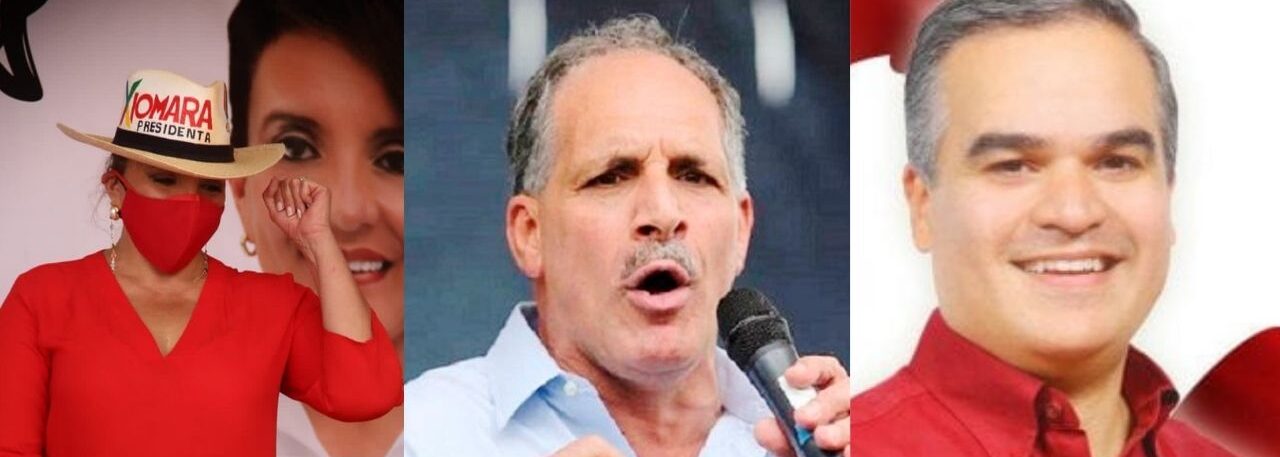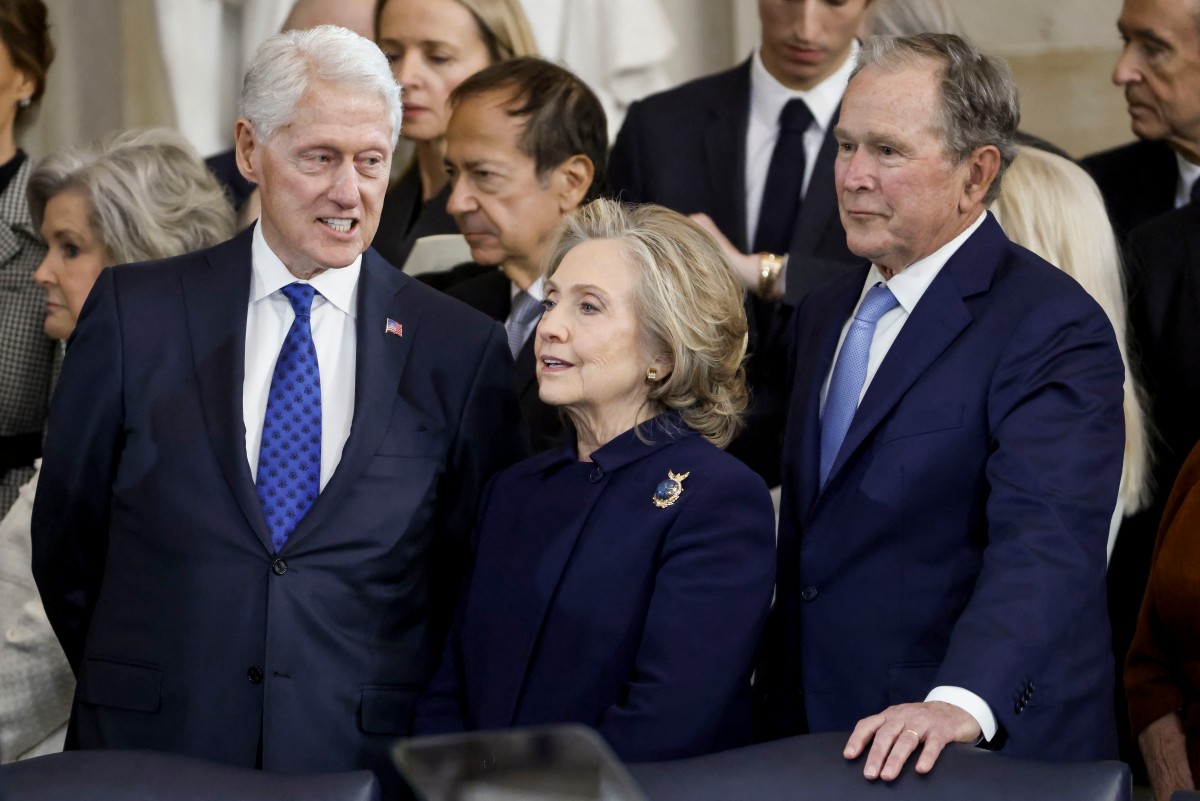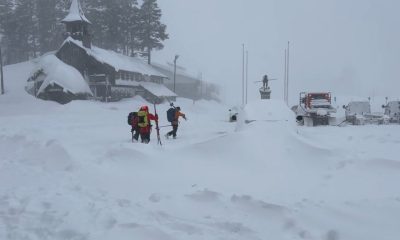International
Honduras elections: the top three candidates

AFP
Thirteen candidates will contest Honduras’s razor-tight presidential election on Sunday to see who will succeed scandal-tainted Juan Orlando Hernandez.
Here are short profiles of the top three challengers.
– Left –
Xiomara Castro was never meant to run for president, but she is the front runner to become her country’s first female leader.
As the wife of Manuel Zelaya, she was first lady in 2009 when her husband was deposed in a coup supported by the military, business elites and the political right.
She made her name leading mass street protests against the coup and there began her own rise to presidential hopeful.
Tough but softly spoken, her popularity stems from her defense of the poor.
But in a deeply conservative and macho country, she faces the twin difficulties of opponents branding her a communist and a puppet for her husband.
“The shadow of Zelaya weighs heavily on her, and in Honduran society it can be assumed that Zelaya is the power behind the throne,” sociologist Eugenio Castro told AFP.
The ruling party has also tried to discredit her proposals to legalize abortion and same-sex marriage — touchy issues in much of Central America.
Often seen wearing denim jeans, and always with a white cowboy hat, the 62-year-old insists she stands for a “Honduran-style democratic socialism” and has tried to distance herself from the leftist models in Cuba and Venezuela that scare many voters.
Already an unsuccessful candidate in 2013, when she narrowly lost to Hernandez, Castro has some heavyweight backing this time — not least in Salvador Nasralla, a television host who lost out to Hernandez in 2017 amidst accusations of fraud.
Castro was born into a middle-class Catholic family and married Zelaya aged just 16. The couple have four children.
Zelaya says the children have a mix of Spanish, Basque, indigenous, Arab and Senegalese blood.
– Right –
Tall, slim and always seen in jeans, a long-sleeved blue shirt and farming boots, Nasry Asfura likes to present himself as a rural worker allergic to offices.
The 63-year-old of Palestinian descent, the current mayor of Tegucigalpa, is the candidate for the ruling right-wing National Party (PN).
With that comes the benefit of the political machinery that has kept the PN in power for a dozen years, but also the stigma of being linked to drug trafficking and corruption.
“I have never spent a single day sat in my office in the town hall, every day I go out into the streets to serve and see where there are problems,” he said, vowing to generate jobs if elected.
He is credited with improving the traffic congestion in Tegucigalpa by building many bridges, tunnels and roundabouts in the capital during his two four-year terms as mayor.
The father of three is a graduate in civil engineering and created a construction company that became one of the biggest in the country.
Although styled as the law-and-order candidate, Asfura has not escaped the accusations of corruption blighting many Honduran politicians.
“He has been accused not just in Honduras, (but also) the Pandora Papers and in Costa Rica. That’s not a good sign,” said Eugenio Sosa, a professor of sociology at the National University.
Asfura was accused in October 2020 by the public prosecutor of embezzling $700,000, while he was linked in the Pandora Papers to influence peddling in Costa Rica.
And while he has not been linked himself to drug trafficking, “he’s been compromised by protecting Hernandez,” said Sosa.
– Center –
The centrist candidate, Yani Rosenthal, is a convicted drug trafficker.
He spent three years in a US jail after admitting laundering drug trafficking money. He was released in August 2020, just in time to run for president.
He is the son of the late Jaime Rosenthal, one of the richest people in Honduras — and prison time was tough on someone used to a silver spoon.
“I learned to wash myself from the waist up in the sink and from the waist down in the toilet,” said the 56-year-old.
Despite his criminal record, in March he won the primaries to be the center-right Liberal Party’s candidate.
The law graduate has his work cut out as his beaten rival, Luis Zelaya, refused to support him and is instead backing Castro.
He has presented himself as the centrist candidate against “left-wing extremism” and PN corruption.
“We don’t want a radical leftist path, nor a corrupt right-wing one, we want a liberal path down the center,” he said.
He claims to be the only candidate able to present “viable” economic solutions and has vowed to give every adult a $60 monthly voucher.
A father of four, he was minister of the presidency for two years under Zelaya and says he has a track record of creating jobs.
International
Federal Judge Blocks Trump Policy Allowing Deportations to Third Countries

A federal judge ruled on Wednesday that the policy of U.S. President Donald Trump’s administration allowing immigration authorities to deport foreign nationals to third countries without prior notice or the opportunity to object is unlawful. The decision marks another legal setback for the administration on immigration matters.
Judge Brian Murphy of the U.S. District Court for the District of Massachusetts struck down the regulation issued last year, which stated that Immigration and Customs Enforcement (ICE) was not required to notify migrants if they were to be sent to countries other than the one listed in their removal order, provided that receiving nations offered assurances they would not face persecution or torture.
Murphy ordered the measure vacated but granted a 15-day delay before the ruling takes effect, giving the Trump administration time to file an appeal.
In his decision, the judge concluded that the policy violates federal immigration law and migrants’ due process rights. He also questioned the lack of transparency surrounding the alleged assurances provided by receiving countries, stating that “no one really knows anything about these supposed ‘assurances.’” He added, “It is not right, and it is not lawful.”
The ruling follows several legal disputes involving deportations to third countries. Last year, the executive branch deported more than 200 Salvadorans to a maximum-security prison in El Salvador, invoking an old wartime law. The White House also held talks with Costa Rica, Panama, and Rwanda about receiving migrants who are not citizens of those countries.
In May, the same judge determined that the government violated a court order when it attempted to remove a group of immigrants with criminal records to South Sudan without prior notice or an opportunity to raise claims of fear of persecution.
Although President Donald Trump took the case to the U.S. Supreme Court, which temporarily allowed the deportations to resume while a final decision was pending, the White House is expected to again appeal to higher courts to overturn this latest judicial ruling.
International
Cocaine Production Surges 34% in 2023 as Market Expands into Africa and Asia

The global cocaine market is the fastest-growing among all illicit drugs worldwide, the International Narcotics Control Board (INCB) warned on Thursday in its annual report presented in Vienna.
The body attributes this expansion to the sustained rise in production in South America — particularly in Colombia — as well as increasing demand in emerging regions such as Africa and Asia.
According to the report, global cocaine production surpassed 3,700 metric tons in 2023, marking a 34% increase compared to 2022. This growth is largely driven by the expansion of illicit coca cultivation in Colombia and the greater production capacity of clandestine laboratories.
The INCB noted that the market has not only grown in volume but has also diversified and become more globalized. While Europe and North America remain the primary destinations, trafficking routes now reach “all regions of the world,” including Africa — traditionally considered a transit zone — and Asia, where the presence of cocaine was previously marginal.
In Western and Central Europe, for the fifth consecutive year, seizures in 2023 exceeded those in North America, consolidating the region as the leading destination market. Between January 2019 and June 2024, more than 1,826 metric tons of drugs bound for European ports were seized, of which 82% was cocaine, equivalent to 1,487 metric tons.
The report also highlights that seizures in Africa rose by 48% in 2023 compared to 2022, reflecting the expansion of the market on the continent. Globally, the number of cocaine users increased from 17 million in 2013 to 25 million in 2023.
International
Clinton Accuses Republican Committee of Using Epstein Case to Shield Trump

Former U.S. Secretary of State and former First Lady Hillary Clinton denied on Thursday before a congressional committee that she had ever met convicted sex offender Jeffrey Epstein in person or had any knowledge of the crimes he committed.
Clinton testified behind closed doors from New York before the House Oversight Committee. The wife of former President Bill Clinton — who is scheduled to testify on Friday — accused the Republican-controlled committee of summoning her in order to “distract attention” and “cover up” the activities of President Donald Trump, who had past ties to Epstein.
“I do not recall ever meeting Mr. Epstein. I never flew on his plane nor visited his island, his homes, or his offices. I have nothing further to add,” she stated.
The former Secretary of State emphasized that she “had no idea about the criminal activities” of the financier, who died in prison in 2019. “Like any decent person, I was horrified when I learned of his crimes,” she said.
Clinton described the Epstein case as “a tragedy” and “a scandal” that deserves “a thorough investigation,” but criticized the committee for failing to summon what she called the truly relevant individuals.
“Instead, you have asked me to testify, knowing that I have no knowledge that would serve your investigation, with the purpose of distracting from President Trump’s activities and shielding him despite the legitimate demand for answers,” she said.
The questioning, conducted behind closed doors in Chappaqua, New York — where the Clintons reside — took place one day before former President Bill Clinton was scheduled to appear at the same location.
Although the Clintons initially declined to testify before Congress, the threat of being held in contempt ultimately led the former presidential couple to agree to appear and explain their relationship with Epstein.
-

 International1 day ago
International1 day agoFamily of “El Mencho” Seeks Return of Body After Deadly Military Operation
-

 International1 day ago
International1 day agoLarry Summers Steps Down from Harvard Role Amid Epstein Controversy
-

 International5 days ago
International5 days agoNinth Victim Recovered After Deadliest U.S. Avalanche in Decades
-

 International1 day ago
International1 day agoIran’s President Optimistic Ahead of Geneva Nuclear Talks with U.S.
-

 International4 days ago
International4 days agoOver 40 Million Affected by Major Snowstorm in Northeastern U.S.
-

 International1 day ago
International1 day agoStephen Hawking Photo Appears in Newly Released Epstein Documents
-

 International1 day ago
International1 day agoBill Gates Admits “Serious Mistake” Over Epstein Ties
-

 International4 days ago
International4 days agoNine People Killed in Two Armed Attacks in Manabí, Ecuador
-

 International9 hours ago
International9 hours agoCocaine Production Surges 34% in 2023 as Market Expands into Africa and Asia
-

 International9 hours ago
International9 hours agoFederal Judge Blocks Trump Policy Allowing Deportations to Third Countries
-

 International9 hours ago
International9 hours agoClinton Accuses Republican Committee of Using Epstein Case to Shield Trump




























